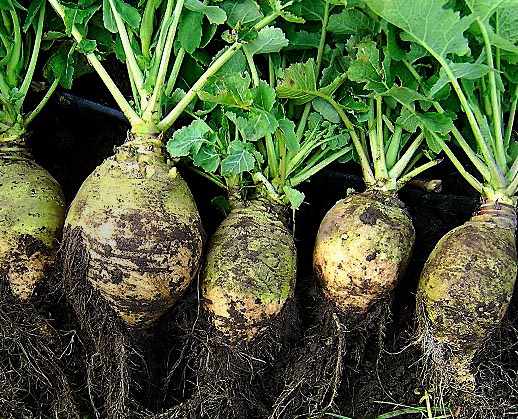Rutabaga
Benefits and Uses of Rutabaga. The rutabaga, believed to be a hybrid of the turnip and some form of cabbage, has a much more recent origin than the turnip. Some authorities say rutabagas are native to Russia and Siberia, others that the new species was first found in Europe some time in the late Middle Ages and probably originated in Scandinavia. It is said there was no record of the rutabaga until 1. Swiss botanist, Casper Bauhin, described it. The word "rutabaga" comes from the Swedish "rotabagge." "Rota" means "root." It is often called Swedish turnip. The rutabaga was known in the United States in about 1.
Rutabaga has many national and regional names. Rutabaga is the common North American term for the plant. This comes from the old Swedish dialectal word rotabagge.
Both white and yellow- fleshed rutabagas have been known in Europe for more than three hundred years. In England, rutabagas were grown in the royal gardens in 1.
Botanically, the rutabaga is a member of the same genus that cabbage, kale, cauliflower, Brussels sprouts, collards, broccoli, turnips, and others belong to, the genus Brassica. However, it is a distinct species. The roots of the rutabaga are either globular or elongated, and the leaf has no hair and is fleshier than the turnip. Also, the rutabaga has a longer ripening period. The turnip has flat roots, hairy leaves that are not fleshy, and the plants take less tune to mature.
Additionally, the rutabaga has much denser flesh than the turnip and is somewhat higher in total dry matter and total digestible. Although there are white- fleshed and yellow- fleshed varieties of both turnips and rutabagas, most rutabagas are yellowfleshed and most turnips are white- fleshed.
A cross between a turnip and cabbage, the rutabaga belongs to the same cruciferous family of vegetables as broccoli, Brussels sprouts and kale. Once it's washed and. The rutabaga is a root vegetable similar to a turnip, and rutabaga health benefits include fighting cancer and aiding digestion. Try this. Define rutabaga. rutabaga synonyms, rutabaga pronunciation, rutabaga translation, English dictionary definition of rutabaga. n. 1. A plant in the mustard family. Looking for rutabaga recipes? Allrecipes has more than 50 trusted rutabaga recipes complete with ratings, reviews and cooking tips.
A further important difference is that the rutabaga grows best where the weather is colder, and is principally cultivated in the northern latitudes. Rutabagas should be firm and fairly smooth, with few leaf scars around the crown and with very few fibrous roots at the base. Soft or shriveled rutabagas are undesirable, because they will be tough when cooked. Avoid roots that are light for their size, as they are likely to be tough, woody, pitted, or hollow and strong in flavor. Rutabagas are sometimes recommended for cases of constipation. However, because of their mustard oil content, they are apt to cause gas.
Find rutabaga recipes, videos, and ideas from Food Network. Rutabaga Paddlesports - kayak and canoe leader for 30 years. Rutabaga sells outdoor gear and clothing for fashion and sport. Snowshoes are our winter interest.
They should not be used by anyone who suffers with kidney troubles. Rutabagas contain more vitamin A than turnips. Rutabagas should be steamed or stewed.
They are a starch food, and this should be considered when combining them with other foods. Nutrients in one pound Calories. Iron. 1. 5 mg Protein. I. U. Fat. 0. 4 g 0. Carbohydrates. 42. Leftover Prime Rib Stroganoff.
Calcium. 25. 4 mg 3. Phosphorus. 15. 0 mg Ascorbic acid 1.
